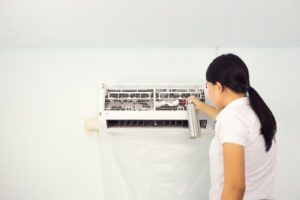 Owning a central air conditioner is essential for many Americans living in parts of the country with extreme temperatures throughout the summer months. However, air conditioners are intricate pieces of machinery that require regular maintenance for a long and productive lifespan, and nothing lasts forever. You might be diligent about taking care of your system with DIY preventative maintenance and routine service calls from a licensed HVAC contractor, but eventually, your air conditioner will cease to work cost-effectively. When that happens, you’ll need to replace it. The question on many of your minds will probably be: when should I replace my air conditioner?
Owning a central air conditioner is essential for many Americans living in parts of the country with extreme temperatures throughout the summer months. However, air conditioners are intricate pieces of machinery that require regular maintenance for a long and productive lifespan, and nothing lasts forever. You might be diligent about taking care of your system with DIY preventative maintenance and routine service calls from a licensed HVAC contractor, but eventually, your air conditioner will cease to work cost-effectively. When that happens, you’ll need to replace it. The question on many of your minds will probably be: when should I replace my air conditioner?
The first struggle for many people is to differentiate between a malfunction that requires your entire system to be replaced and one that can be fixed with a simple repair. That’s not all you’ll have to consider, though. You’ll also have to think about whether your system is likely to break down again soon after you’ve paid for repairs. Some systems may be prone to enough problems that even relatively inexpensive repairs can build up quickly in short periods of time, and make replacement a more cost-effective option overall.
When Should I Replace My Air Conditioner vs When Should I Repair?
Let’s begin by addressing the “repair or replace” problem. The truth is, your system can always be repaired. There is technically no malfunction severe enough that you can’t call in a technician to fix it. The question isn’t whether you can, though—it’s whether you should. The decision you make should be based on how much money it is likely to save you as you continue to use your system. Simply put, some air conditioners are worth fixing, and others aren’t. The primary factor to consider when making this determination is age, but there are others.
The Rule of Thumb I Use to Determine When I Should Replace My Air Conditioner
There’s no exact and universal equation for determining exactly when a system is too old to be used cost-effectively, but most HVAC contractors use a simple formula to make their recommendation. To use this method for yourself, you’ll need three pieces of information: the price of a replacement air conditioner, a quote for your current system’s repair costs, and the age of your current system in years.
The rule of thumb is this: multiply the expected repair costs for your current system by its age in years. If the result is less than the cost of a new unit, repair your current model. Otherwise, consider replacement. Some contractors use a flat figure of $5000 instead of the exact price of a new unit, but the more specific you are, the more help this formula will offer.
Using the above formula considers the fact that old air conditioners break down more frequently than newer models. However, there’s something else you should think about when deciding between a repair and a replacement: the availability of compatible parts. Let’s look at refrigerant for example:
Refrigerant and Cost-Effectiveness: a Case Study in AC Economics
Old air conditioners tend to use R-22 refrigerant, whereas many new models are built to use R-410a. What does that mean? Simple: as R-410a becomes the norm, it will become harder to find refrigerant suitable for use in older air conditioners. As a result, the costs to top up refrigerant in these systems will likely increase. The cost is already many times what it used to be, so if your system uses R-22, then replacement is an option you should probably keep on the table.
Keep Track of Your Costs
There’s one other easy strategy for determining when to replace your air conditioner: check your utility bills each month. If your company isn’t raising the rates but your costs are going up, then your air conditioner is probably losing its efficiency. This is a surefire way to tell that your system isn’t cost-effective anymore.
Keep Up with the Times
Finally, it’s important to realize that many older air conditioners weren’t built to cope with the temperature changes of the last few years. Science doesn’t lie: the planet is getting hotter. Among the numerous consequences that this has for humans, there’s at least one pertaining specifically to air conditioners: a unit that was adequately sized to your home a decade ago may not be powerful enough to cool it efficiently now. Hopefully, we’ll come up with a solution for global warming soon, but until then you might want to have a more powerful air conditioner in your home.
Remember: you can always choose to repair your air conditioner instead of having it replaced by a licensed HVAC technician, but that may not be good for your long-term finances. Instead of wondering, “when should I replace my air conditioner?”, think about how you will replace it and who you’ll choose for help when the time inevitably comes.
